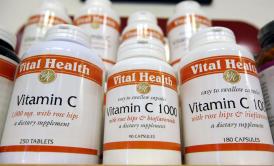You might want to rethink spending money on those expensive immune boosters and weight-loss pills.
A new report by the U.S. Department of Health Services has found that dozens of dietary supplements on the market are illegally labeled and lack the recommended scientific evidence to back up their purported health claims.
The Associated Press with details on how the illegally labeled products are misleading consumers:
The inspector general found that 20 percent of the 127 weight loss and immune-boosting supplements investigators purchased online and in retail stores across the country carried labels that made illegal claims to cure or treat disease.
Some products went so far as to state that the supplements could cure or prevent diabetes or cancer, or that they could help people with HIV or AIDS, which is strictly prohibited under federal law.
Consumers may not just be wasting their money on pills or tablets, but they could be endangering their health if they take a supplement in place of a drug thinking it will have the same effect, the report concluded.
Although you probably won’t be risking your health by taking vitamin C tablets or Echinacea to combat that stubborn cold, the report found that “some supplements make disease claims that could mislead consumers into using them as replacements for prescription drugs or other treatments for medical conditions, with potentially dangerous results.”
In response, the FDA has called for expanded surveillance of the market to better protect consumers against false claims that supplements can cure or treat specific diseases.
